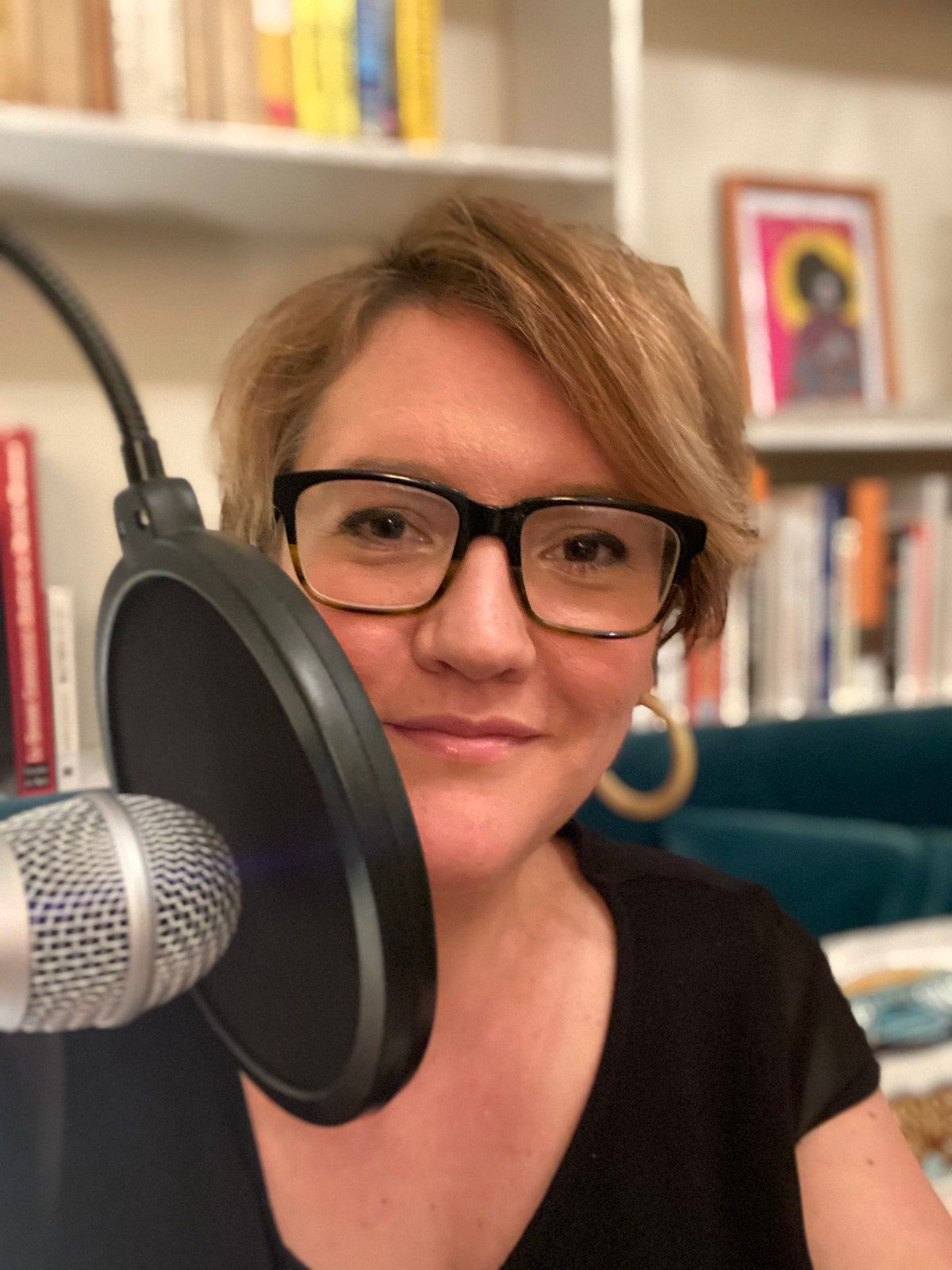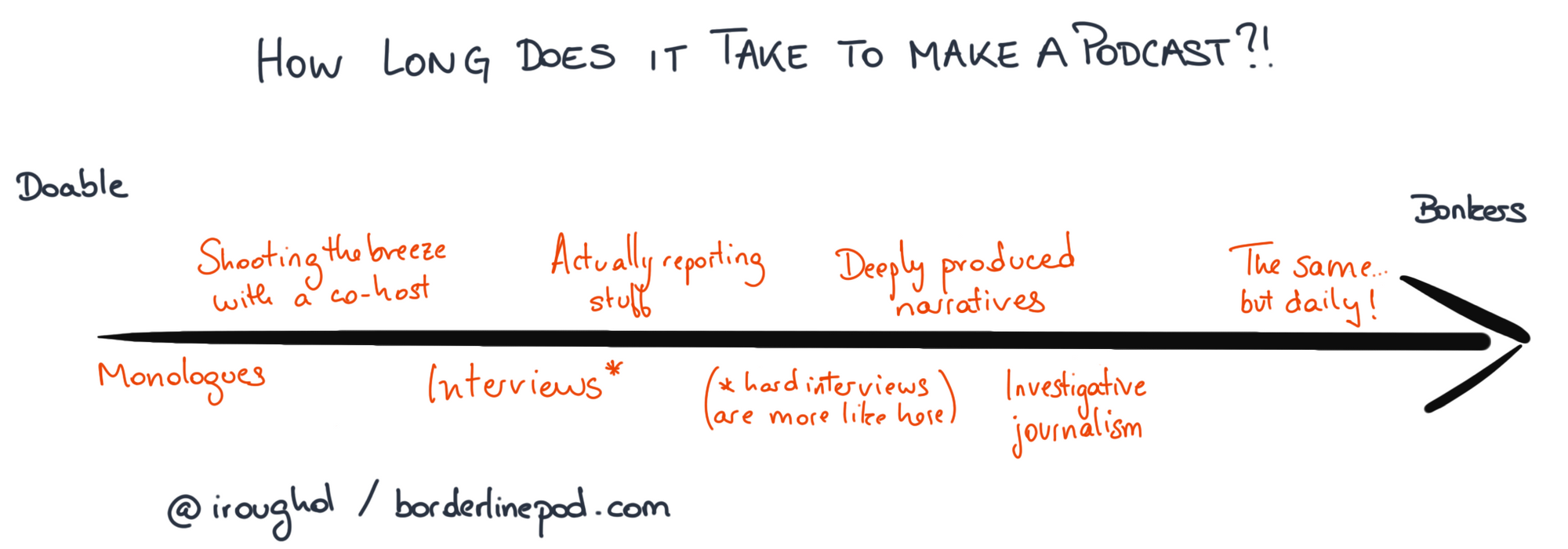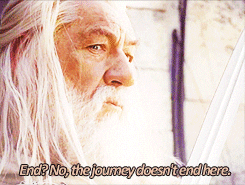
How to produce a podcast without it taking over your life
Do everything I didn't do
The most unexpected way podcasting has changed my life is in the number of people who have suddenly appeared in my inbox sharing their own podcast ambitions and asking for guidance. I love it. Having 15 amateur episodes under my belt does not make me a podcasting expert, but I have learned a few things worth sharing this year. This is the first of maybe a few newsletters doing just that.
The hardest part of running an independent podcast is finding the time. Regularity is key to building an audience, but most of us also have to do other work to pay the bills. Podcasting will be time-consuming, but it doesn’t have to be all-consuming. Here are a few things I wish I’d known before launching Borderline.
Choose a less demanding format
Podcasting is really just a distribution mechanism – an RSS feed for audio. Talking about it as a single industry is deceptive. Are your high school AV club and Twentieth Century Fox in the same business? Podcasts live on a scale from the simple one-man-and-his-mic rant to deeply reported, deeply scripted narratives taking whole teams months to produce. As a solo indie podcaster, you’re going to want to be on the left end of this scale. Think about the time it’ll take to find and book guests before embarking on an interview podcast. Make sure you’re not solo if you’re going to need fact-checking. Listen to a similar podcast to the one you envision for yourself, and pay attention to the credits. How many people did it take?

Get a co-host
Having a co-host (or more) has two avantages. First, you can pick the “shoot the breeze” format, which is the least work if you’re both into your topic and reasonably well informed. It all hinges on how good the hosts are, but very successful podcasts essentially work that way: Remainiacs and Pod Save the World are two in my regular rotation. (Some use “shoot the breeze” as a presentation format, but are actually madly reported, like Reply All.) Even if that’s not the only thing on the programme, in an off week, if a guest cancels last minute, you’ve got something to publish. The second advantage, of course, is that you can divide the work, take turns booking guests (and reading their books!) and double up your networks and social media reach. It does require giving up some control, which is why I’ve been incapable of it.
Settle on a realistic cadence
Daily is impossible, we’ve settled that. Weekly is unrelenting. Biweekly or monthly is more realistic, especially if you do other stuff for a living. But the less frequently you publish, the slower your audience growth will be. (It’s not like it’s easy even with weekly episodes.) Regularity matters even more. Your audience needs to know when to expect a new episode and that they can trust you, that you won’t leave them in the middle of a story. This is a case of “do what I say, no what I do.”
Don’t sweat the small stuff
On Borderline, I cut out most of the ums, ahs and you knows. Even with the right software (next post), that can take forever. I’m a detail freak but if I’m honest, my time could be better spent elsewhere. Unless your guest’s diction is particularly laborious, you can probably leave filler words in. They don’t grate in audio the way they do in writing. But if you’re going to do that, make sure your audio quality is top notch (next post after the next post). You want production to be cheaper, not sound cheap.
Invest in your infrastructure
Have a permanent recording corner in your house so you’re not setting up the equipment before every interview. Build automations: I use Zapier to create social updates whenever I publish a newsletter or episode and at regular intervals after that. Set aside a recording day and schedule interviews in batches. Schedule your time. Use GTD, the Pomodoro technique, rainforest sounds, whatever it is that keeps you focused. This has been the big lesson of this autumn for me. I’ve been doing tasks as they came up, and it’s felt like my mind was being tugged in five different directions at all times. It’s not efficient and it makes you lose a sense of momentum. Take the time to build good workflows.
Have a backup plan
Have several episodes in the can before you even launch. Prepare evergreen content that you can release in an off week, if a guest cancels, if your other work is too demanding or if you lose all motivation to lockdown and 3 pm darkness. Schedule your podcast in seasons, making sure to take enough time off in-between, not just to rest but to plan for the months ahead. Try not to lay the track as the train advances, or at least give yourself a little headstart.
Allow for a learning curve
The good news is you will only get faster. You can learn everything about podcasting from listening to pods, playing around with software (most of it free) and googling. The learning curve is steep but it’s all accessible. Be kind with yourself at the start and allow extra time. Learning by doing is the best way. Release episodes, get feedback, improve. If you stick with it, the bad early ones will soon be pushed way down the list and you can forget they ever existed.
All this to say…
I’m not podfading
I just haven’t been very good at following my own advice. I had to stop the train to lay more tracks. There will be two more episodes before Christmas to close off season 2. I will then take a few weeks to work on the business, not in the business, as they say. I have ideas aplenty for 2021 and can’t wait to get into it. (This is podfading and it’s as old as podcasting.)

Wanna help with the pod?
- I’m always looking for topic and guest recommendations. Get in my inbox.
- Share, share, share. Rate and review. Tell all your friends. That’s the only way our community grows.
- Become a member and help me ignore all other work and spend more time on Borderline. Join on Patreon or subscribe below on Substack.

Hey, you read to the end!
Don’t miss future articles like this one; let me into your inbox.






